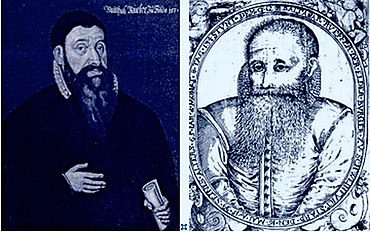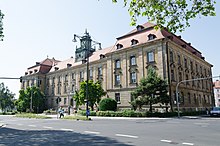Balthasar Rüffer
Balthasar Rüffer (* 7. March 1534 in Fulda , † 16th May 1599 in Schweinfurt ) was a wealthy merchant and in the years 1578 / 79 second mayor and 1585-1587 Mayor of the city of Wuerzburg . For reasons of faith he emigrated in 1588 from the Catholic city of Würzburg to the Protestant imperial city of Schweinfurt.
Live and act
Youth in Fulda
Balthasar Rüffer, usually referred to as Balthasar II, was baptized as a Protestant on March 7, 1534 in Fulda. His parents were the Fulda merchant and councilor Balthasar Rüffer (I.) and his wife Margaretha, née Reb.
Relocation to Würzburg
Around 1552 he moved to Würzburg, where on December 22, 1552 he became a citizen. Since, as at every prince-bishop's court at that time, the need for high-quality goods and luxury items could only be partially covered by local handicrafts, the local merchants had to procure industrial products and luxury goods such as spices, cloth and stockfish, as well as exporting the regional produced wine, a profitable business. The merchants represented the largest as well as the wealthiest group in Würzburg at that time. They belonged to the economic and political ruling class, and the followers of the Protestant religion were tolerated by the prince-bishop as long as they kept quiet. In addition to wine, Rüffer mainly traded wool, Zwilch and dried fish, which he obtained from afar. It is believed that Baltasar also used to visit the Leipzig trade fair, because his large fortune suggests long-distance trade. In 1640 it was ranked 40th on the Würzburg tax list with 2,710 guilders net.
Rüffer lived in a little house in Sand in Judengasse, but in the 1560s bought the stately house Zum Lindwurm in Ursulinergasse 1. The house burned down completely in the Second World War .
Offices in Würzburg
Councilor
Rüffer's election to the sub-council of the Würzburg city council was rejected several times by the Würzburg cathedral chapter because of his denomination . It was not until 1577 that he made the leap into council membership (the term of office was not limited). In the absence of suitable Catholic candidates, some of the applicants were unable to read, write or do arithmetic, he was finally appointed by the Catholic Würzburg Cathedral Chapter despite his religious affiliation. It was not until 1587 that the Catholic profession became a duty for the councilors.
mayor
In 1578 he was appointed lower (or second) mayor and in 1582 councilor "in the upper council", on November 26, 1585 he was appointed "senior mayor" (or mayor). In March 1587, the Würzburg prince-bishop Julius Echter von Mespelbrunn pushed through the Counter-Reformation in the city. Of 600 citizens who adhered to Protestantism, 73 emigrated with their families. On June 15, 1587, Balthasar was relieved of all his offices, like all Protestant councilors who refused to convert to the Catholic denomination, because he “did not want to submit to papal trinkets and errors”.
Emigration to Schweinfurt
Work in Schweinfurt
On May 1, 1588, he emigrated to the Protestant imperial city of Schweinfurt. Only his son Hieronymus remained to handle business until 1591, after he had paid an additional tax of 400 guilders in Würzburg, in this case it was levied as an exit tax. Since this was usually two percent, his assets at that time should be estimated at around 20,000 guilders.
With his departure and his fellow believers and his fellow believers, a considerable part of the long-distance trade in oil, dried fish and wool seems to have been lost for Würzburg, because the lower council complained about the decline in tax revenues until 1590, only afterwards did an economic upswing return.
In Schweinfurt, Balthasar first lived in Kirchgasse 27, later in Spitalgasse 9 and from 1594 on Metzgergasse 16 (today's house numbers) in the old commercial district . There he worked again as a merchant and temporarily as mayor until his death.
On October 7, 1588, it is noted in the Würzburg council minutes that Balthasar Rüffer and Bastian Hübner from Schweinfurt buy up oil, woolen and twilche cloths and dried fish to the detriment of the monastery, thus starting a kind of trade war against the monastery. In fact, the monastery tried for years to hinder trade with Schweinfurt citizens until an imperial decree in 1594 ended the trade war. The tradition may go back to this time that Rüffer went for a walk in the garden of his house (Kirchgasse 27) because he could not venture outside the city gate because of the Würzburg captors.
Balthasar was already a helper for the poor during his lifetime. On the large picture donated in his memory, “Sermon John the Baptist in the Desert”, which still adorns the Johanneskirche in Schweinfurt today , the dedication from him praises that he was charitable in the spirit of John.
Final resting place
Balthasar died suddenly and unexpectedly (from a heart attack?) At the age of 65 on May 16, 1599 in Schweinfurt and was buried there on May 18.
Rüfferstrasse
In honor of Balthasar Rüffer, the street in Schweinfurt in front of the western, partly still preserved city wall , between the old town and the Wilhelminian style district , was named Rüfferstraße . It is located in today's city area, has recently gained in importance and was redesigned until 2007.
Web links
- Dietger Braun: The history and the family tree of the Scipio and Rüffer family. Peter Hofmann, accessed February 13, 2018 .
Remarks
- ↑ The name "II" in the literature comes from the fact that it was tradition in the Rüffer family to name the eldest son Balthasar, which understandably led to problems of differentiation. Balthasar I. is thus the councilor of Fulda born in 1500, Balthasar II. The councilor and mayor of Würzburg born in 1534 and finally Balthasar III. the councilor and bailiff of Schweinfurt, born in Würzburg in 1569.
- ↑ Dense, firm and hard-wearing fabric construction in twill or ticking weave. The Zwilch or Zwillich is named after its double threads, the name comes from Old High German.
| personal data | |
|---|---|
| SURNAME | Rüffer, Balthasar |
| BRIEF DESCRIPTION | German politician, Mayor of Würzburg |
| DATE OF BIRTH | March 7, 1534 |
| PLACE OF BIRTH | Fulda |
| DATE OF DEATH | May 16, 1599 |
| Place of death | Schweinfurt |


